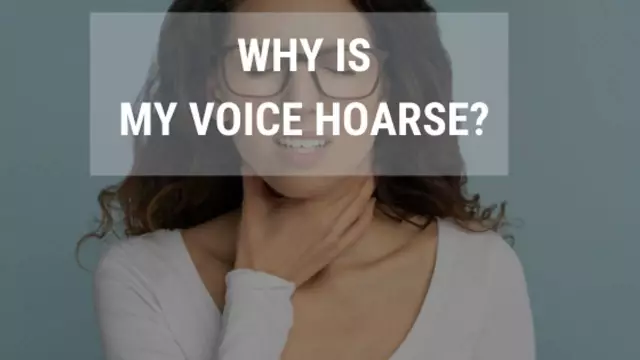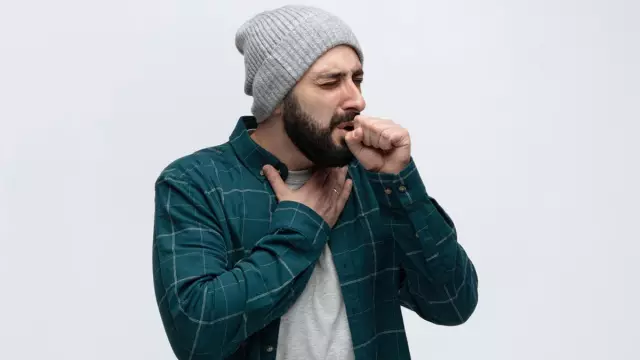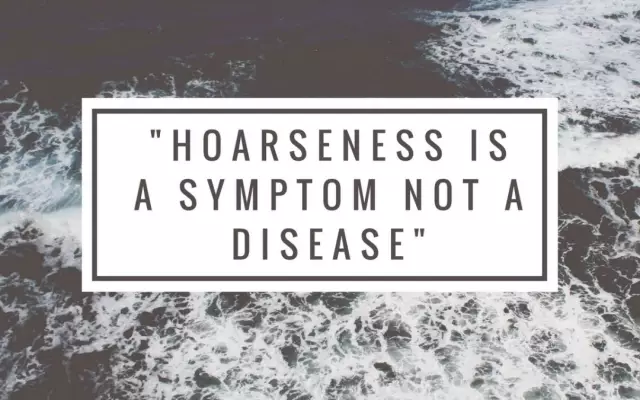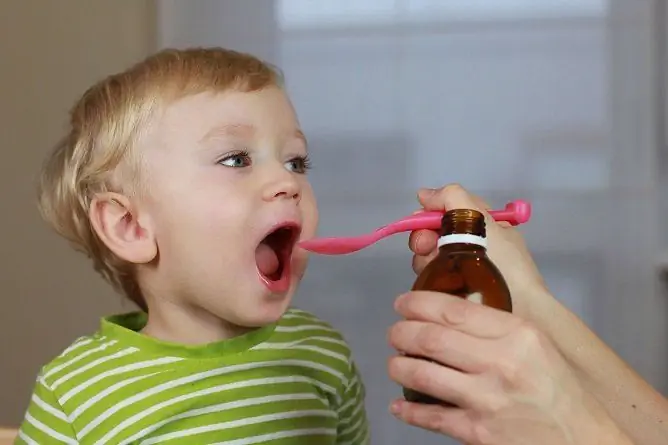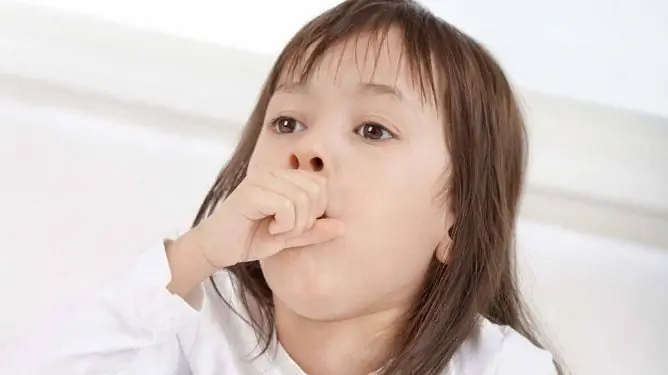- Author Rachel Wainwright wainwright@abchealthonline.com.
- Public 2023-12-15 07:39.
- Last modified 2025-11-02 20:14.
How to treat a hoarse voice and cough in a child and the reasons for their appearance
The content of the article:
-
The reasons
- Viruses
- Bacteria
- Allergy
- Overstrain of the vocal cords
- Stenosing laryngotracheitis
- Symptoms and diagnosis
-
How to treat a hoarse voice and cough in children
- Emergency care for stenosing laryngotracheitis
- General recommendations
- Etiotropic treatment
- Further treatment
- Video
How to treat a hoarse voice and cough in a child depends on the cause of this condition. If symptoms have arisen due to overstrain of the vocal cords - the child is treated at home, no medical attention is required. But acute stenosing laryngitis cannot be treated on its own; an urgent need to consult a doctor.
The reasons
A hoarse voice and cough in a child are often signs of laryngitis. Laryngitis is a condition characterized by inflammation of the lining of the larynx. A hoarse voice and cough are caused by swelling of the vocal cords located in the larynx. Depending on the cause, two forms of the disease are distinguished: infectious (viral, bacterial) and allergic laryngitis.

Typically, a hoarse voice and cough are signs of inflammation of the larynx.
Viruses
In most cases, laryngitis is viral in nature. Hoarseness and coughing can be symptoms of colds and SARS.
In addition, laryngitis can occur with flu, measles, herpes. Viral laryngitis is rarely isolated and often occurs with tracheitis in the form of laryngotracheitis. A child can become infected through normal conversation, coughing, sneezing, as viruses are transmitted by airborne droplets.
Bacteria
Bacterial laryngitis in children is less common, but more severe. The cause of inflammation can be staphylococci, streptococci and pneumococci. With bacterial laryngitis, intoxication syndrome comes to the fore, which is caused by a purulent process.
Allergy
A hoarse voice and cough in a child without fever in most cases indicates non-infectious laryngitis. An allergen can be dust, pollen of plants, medicines, animal hair, vapors of household chemicals. A feature of allergic laryngitis is that the disease is exacerbated by contact with an allergen.
Overstrain of the vocal cords
Another reason why a child has a hoarse voice and dry cough is prolonged overstrain of the vocal cords. For example, if a child screamed the day before symptoms began.
Stenosing laryngotracheitis
With stenosing laryngotracheitis, not just inflammation of the larynx occurs, but severe edema and narrowing of the glottis.
The child develops signs of respiratory failure: inability to breathe, rapid breathing, pale or blue skin.
Symptoms and diagnosis
In addition to coughing and a hoarse voice, the child may have other symptoms. Additional signs help identify the cause of laryngitis, which is important for further treatment.
| Symptom | Description | In what cases does it appear |
| Barking cough | The cough is dry at first and then becomes moist. The sound is loud, like a dog barking | With edema of the vocal cords of any etiology |
| Hoarse voice | A hoarse voice can gradually turn into aphonia (complete absence of voice) | With edema of the vocal cords of any etiology |
| Sore throat | Unpleasant sensations are associated with an inflammatory process in the larynx. Pain is constant, worse at night, better after warm drinks | With edema of the vocal cords of any etiology |
| Increased body temperature |
The temperature can rise to subfebrile (with parainfluenza) or febrile numbers (with a bacterial nature). An increase in body temperature is a specific sign of an infectious disease. In other forms of the disease, fever is not observed |
With infectious (viral or bacterial) laryngitis |
| Dyspnea | Difficulty or inability to inhale. Choking occurs abruptly, more often at night. At the same time, the child is excited, scared | With stenosing laryngotracheitis |
The appearance of a hoarse voice and cough in babies is always a concern for parents. Symptoms are extremely dangerous for children under 3 years old (especially under 1 year old). This is due to the structural features of the larynx: their glottis is narrower, so the edema spreads much faster.
An accurate diagnosis, of course, can only be made by a doctor, after examining the child. Diagnostics may require:
- a general blood test - will reveal signs of inflammation or allergies;
- laryngoscopy - examine the larynx mucosa, visualize the swelling of the vocal cords.
How to treat a hoarse voice and cough in children
Therapy includes urgent measures, medical and protective regimen, the use of medications, inhalation. Before starting therapy, it is necessary to identify the cause, since the tactics of treatment depend on this.
Emergency care for stenosing laryngotracheitis
If signs of respiratory failure appear, an ambulance should be called immediately. Before the arrival of the brigade, you need to provide first aid:
- Give the child an upright position.
- Provide fresh air.
- Perform distracting treatments such as foot baths.
- Carry out an alkaline inhalation - warm or using a nebulizer.
In severe condition, diphenhydramine can be administered intramuscularly, glucocorticosteroids can be used in the form of rectal suppositories.
What not to do with stenosing laryngotracheitis:
- Conduct steam inhalation.
- Give hot drinks.
- Use expectorant drugs.
General recommendations
Treatment of laryngitis in children includes medical and protective measures:
- Compliance with vocal rest: the child should not shout, speak loudly or in a whisper. Better to eliminate any stress on the vocal cords.
- Airing the room in which the child is. The air should be fresh and cool.
- Compliance with a sparing diet with the exclusion of irritating foods: spicy, spicy, salty, hot, cold, carbonated.
- With infectious laryngitis, bed rest must be observed.
- Warm, abundant drink. You can give your child slightly alkaline mineral water (without gas), milk with honey, green and fruit tea, rosehip decoction.
Compliance with these recommendations will help the child recover and get rid of the symptoms of the disease faster.

With an infectious disease, especially at elevated temperatures, bed rest is required
Etiotropic treatment
Etiotropic treatment depends on the cause of the symptoms.
If laryngitis is of bacterial nature, then antibiotics are prescribed: penicillins, macrolides or cephalosporins. For example, Amoxiclav, Azithromycin, Cephalosporin.
In allergic laryngitis, it is important to exclude contact with the allergen. For drug treatment, two main groups of drugs are used:
- glucocorticoids - Budesonide, Dexamethasone;
- antihistamines - Suprastin, Loratadin.
With parainfluenza, etiotropic treatment is not used, antiviral drugs do not have the desired effect.
Further treatment
Regardless of the cause that caused the hoarse voice and barking cough, physiotherapy and inhalation are used for treatment. Local treatment is also prescribed: irrigation of the laryngeal mucosa with antiseptics, local anesthetics.
The peculiarity of the treatment of cough with laryngitis is that steam inhalation cannot be used, as this can aggravate the edema. Warm inhalation is recommended. For their preparation, the following solutions are used:
- decoction of chamomile, mint;
- slightly alkaline mineral waters;
- water with soda.
To relieve edema, inhalation of glucocorticoids with a nebulizer or an ultrasonic inhaler is used. For example, the drug Pulmicort is used.
Dry heat (bandages, warming compresses) can reduce inflammation in the larynx.
Video
We offer for viewing a video on the topic of the article.

Anna Kozlova Medical journalist About the author
Education: Rostov State Medical University, specialty "General Medicine".
Found a mistake in the text? Select it and press Ctrl + Enter.


